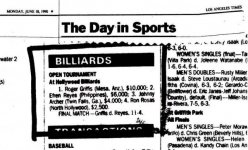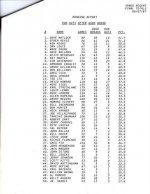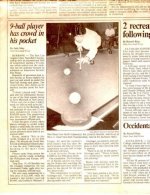Maybe. But this is a perfect example. The tournament directors KNOW how many players there are, and how long the matches take. They should structure the event to make it done by midnight. IF that means doubling the entry to get half the players, or making the races to 5, or limiting the number of entries, or putting a shot clock on the snails, or whatever, so be it. It will make the event better overall if there is a conclusion. And short races make the matches more exciting.
Believe the Mezz West Tour does nor preregister for its events. They may have an idea of the expected turnout, but not an exact number. Oscar did say on the live stream that he had an idea the turnout at Hard Times Bellflower would be big based off his Facebook comments, but did not have a number going in.
If the event is capped at 128, then they should pick a format that will get it finished at a reasonable time. Finishing in the middle of the night is not good for the fans that have followed the event throughout the weekend. A 9 PM Pacific completion should be the goal to keep the audience on both coasts until the end. The end is where the best matches occur between players; this should be the focus to promote the tour.
Limiting the number of players seems counterproductive to promoting the sport. Shortening the races also has a downside; it makes it less likely the best players will advance in a handicapped event due to lucky rolls by the less talented player. This is mostly a concern to the professionals that dislike handicapped events to begin with. As a fan, I prefer to see the best players, so chasing the pros away from these tours is not a good outcome. A tour full of bangers will go nowhere.
Shot clocks are a good idea, but hard to implement for these types of tours.
My suggestion would be to get volunteers to help at each stop of the tour. For the cost of a shirt the tour could get volunteers to help out as referees/assistant TD's. Their responsibilities would include the occasional refereeing and overseeing the event from the floor to help insure the pace of play is upheld. When each match is concluded, they would enter the results into a database that tracks the event. Having 3 or 4 of these volunteers at each stop would be enough. My guess is that they'd get 100 people volunteering with enough billiards savvy to fill these jobs in a short amount of time. Ask and you shall receive. It would also make each event much more enjoyable for those that already have too much on their plate during these events.
It's all a process, and I'm sure they will get it right in the end.


